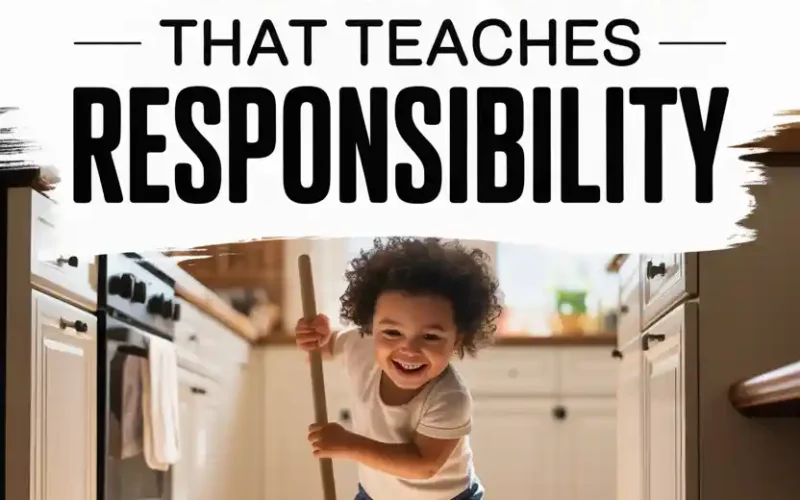Every parent dreams of the mythical child who folds laundry without being asked, empties the dishwasher with a smile, and maybe even dusts the skirting boards on a Tuesday afternoon.
If your house looks anything like mine, you’ll agree this is about as likely as spotting a unicorn in the backyard.
Still, there’s hope. Children can absolutely learn responsibility—and chores are one of the best (and sneakily effective) ways to do it.
The magic isn’t in transforming your living room into a miniature Buckingham Palace, but rather in helping your children build habits that will serve them well long after they’ve forgotten your Wi-Fi password.
Which chores actually teach responsibility? And how do you fit them into an already busy family schedule?
Let’s cut to the chase with five that really work—plus some tricks to get even the most chore-averse kid on board.
1. The Mighty Laundry Mission
Laundry: the never-ending story. It multiplies faster than rabbits and, much like a toddler’s tantrum, seems immune to logic.
But handing over laundry duties in bits—sorting, folding, or even running a load—does more than lighten your load. It’s a masterclass in cause and effect.
Why laundry? Because it’s visual, tactile, and requires a sequence of steps that even younger kids can grasp.
When children learn that red socks with white shirts equals pink undies forever, they start to see how their actions matter.
Researchers at the University of Mississippi found that involving children in household tasks such as laundry before age 12 helps foster independence and a sense of competence well into adulthood.
Start them young: Toddlers can match socks or toss dirty clothes in a basket. Older kids can sort, load, measure detergent, and, if you’re feeling brave, even tackle the dreaded folding.
Pro tip: Make a game of it. Who can match the most socks? Who can fold the neatest shirts? A little friendly competition never hurt anyone.
The bonus for parents? You might never have to sniff-test a mystery pair of pants again. Small victories.
2. Dish Duty—The Unsung Hero
No one is born loving dish duty, but it’s a brilliant responsibility-builder hiding in plain sight. Dishes pile up daily (hourly, if you have teens).
There’s instant visual feedback—plates go from crusty to sparkling, and there’s a genuine sense of accomplishment when the kitchen bench is finally clear.
Giving a child a regular spot on the dishwashing rotation teaches follow-through.
Miss a day? There’s an avalanche of bowls waiting. Skip a step? The next eater finds last night’s curry in their cereal bowl (which, incidentally, is how my kids learned the meaning of “cross-contamination”).
If you’ve got little ones, get them to clear their own plates and rinse them off. Primary schoolers can load and unload the dishwasher or tackle the sudsy stuff with a grown-up’s supervision.
Teenagers? If you can get them to do the dishes without resorting to interpretive dance or TikTok negotiations, you deserve a medal.
Research from the University of Minnesota shows that children who participate in regular family chores such as dishwashing develop stronger work ethics and are more likely to pitch in as adults.
Turns out nagging pays off—eventually.
3. Pet Care—The Four-Legged Accountability Coach
Pets: adorable, fluffy, and possibly the only family members who don’t talk back. Handing over some pet-related chores is a powerful way to instil accountability.
The stakes are real—Fluffy or Rex depends on your child for food, water, and maybe even a cheeky belly rub.
Feeding pets at scheduled times, ensuring water bowls are full, and even picking up after them teaches that responsibility isn’t just a checklist—it’s about caring for another living being.
That’s empathy in action, with a hefty side of routine.
Start small—feeding or brushing is ideal for younger kids. As they grow, add dog walking or litter tray duty. You know your child’s maturity best.
And remember: a hungry guinea pig is a surprisingly effective supervisor.
According to a study from the American Academy of Child & Adolescent Psychiatry, children who are involved in pet care develop higher self-esteem and improved social skills, along with a keener sense of responsibility.
Plus, you’ll get a break from the “Who’s going to feed the dog?” debate.
4. Trash and Recycling—the Reluctant Rite of Passage
Taking out the bins is not glamorous, but it’s perfect for teaching consistency. The rubbish doesn’t care if your child is tired, engrossed in Minecraft, or has just remembered a forgotten science project.
It demands attention, and skipping a week leads to consequences everyone can smell.
Start by assigning age-appropriate bin duty: young kids can gather small bins from bedrooms or bathrooms, while older children can haul out the big ones and ensure everything goes in the right spot (cue the great recycling mystery).
There’s also the added bonus of sneaking in a lesson about environmental responsibility—why recycle, what can be composted, and how every little action adds up.
According to the Environmental Protection Agency, children who are taught to reduce, reuse, and recycle at home are more likely to continue these habits into adulthood. It’s civic duty, with a whiff of banana peel.
Give your child a reminder system if needed—phone alarms, colourful sticky notes, or the age-old tradition of the “Bin Song” (our family’s original composition, sung off-key every Tuesday night).
5. Meal Prep—From Chaos to Culinary Confidence
Getting children involved in meal prep not only teaches responsibility, but also helps them develop life skills that are, quite frankly, essential for survival beyond the age of 18.
Cooking is part chemistry, part project management, and part “do not touch the stove until I say so.”
Start simple: let little ones wash veggies, stir batter, or set the table. As attention spans and confidence grow, older kids can peel, chop, measure, and eventually take the lead on a family meal.
There’s nothing quite like watching your child beam as everyone tucks into their spaghetti Bolognese—even if the noodles come with a healthy dusting of kitchen chaos.
Meal prep responsibilities teach planning (“Do we have any pasta left?”), health awareness (yes, greens matter), and even a bit of maths (fractions have never tasted so good).
Psychologist Julie Lythcott-Haims, author of “How to Raise an Adult”, argues that involving kids in real-world tasks like cooking builds self-sufficiency far better than any sticker chart.
What if you’re rubbish at cooking yourself? Congratulations—you’re modelling lifelong learning. I
nvite your child to pick recipes, watch YouTube tutorials together, and laugh through the inevitable “mystery meal” nights. No one said perfection was on the menu.
How to Make Chores Stick (Without Losing Your Sanity)
Chores should never be punishment—think of them as “family contributions.” The goal isn’t to create a battalion of miniature butlers, but to nurture confidence, pride, and that magical “I did it myself” moment.
Here’s what works in real households:
- Consistent routine is your secret sauce. Agree on a schedule—Sunday laundry, Thursday bins, Friday pet spa.
- Visual chore charts appeal to every kid’s inner sticker collector (and remind adults too).
- Lead by example. If you treat chores as beneath you, don’t expect your child to feel any different.
- Praise effort, not just results. Sometimes the dog ends up with salad for dinner. Celebrate the attempt.
- Allow for consequences when chores aren’t done. No clean uniform? Oops. Natural consequences are great teachers.
- Rotate chores so no one gets stuck as “Bin Captain” for eternity. Variety keeps complaints fresh.
- Keep tasks age-appropriate and add responsibility slowly. Rome wasn’t built in a day, and neither is a helpful child.
Don’t expect overnight transformation.
Some days the only thing your child will choose to pick up is a stick in the garden. Other days, you’ll find them vacuuming with gusto, lost in a world of dust bunnies and burnt toast crumbs. Progress over perfection.
Raising Responsible Kids One Chore at a Time
Assigning chores isn’t about getting a cleaner house (though, what a lovely bonus). It’s about giving your children the gift of capability.
When children master the art of laundry, dish duty, pet care, bins, and meal prep, they’re not just ticking off tasks—they’re learning life skills that will carry them far beyond your front door.
And on those days when the only thing your child manages is putting their shoes vaguely near the rack, take heart. Every small step matters.
You’re not raising robots. You’re raising humans who, one dish and one bin at a time, are learning that their efforts matter—at home, and in the world.
Pass the tea and celebrate the socks that made it to the drawer. That’s parenting progress.




